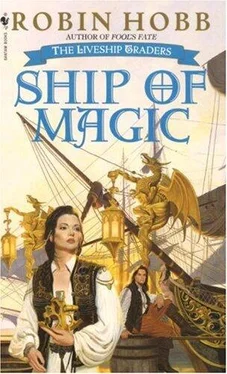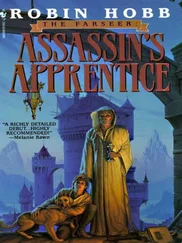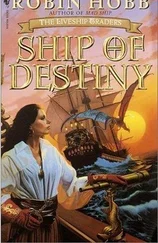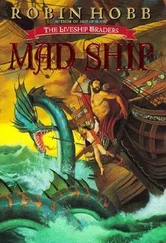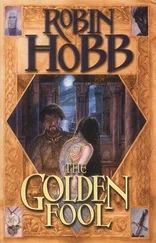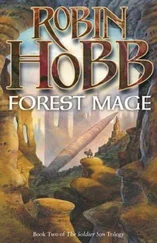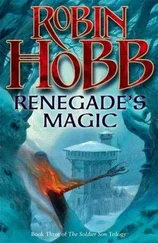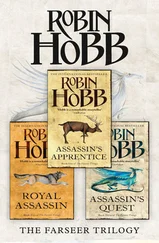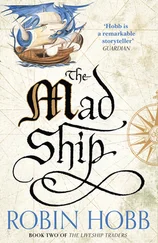Then Kennit's voice spoke softly by her left ear. Despite the storm, he did not shout. His low voice was little more than a whisper. “It's easy, really. Lift your eyes, look ahead. Now feel the ship through the wheel. There. Loosen your hands. You will never be able to react if you throttle the wood so. There. Now you can feel her. She speaks to you, does she not? Who is this, she wonders, who is this light new touch on the helm? So hold her steady and reassure her. Now then, now then, ease her over a bit, just a bit, not too much, and hold her steady there.”
It was his lover's voice he spoke with, small and breathless, warm with encouragement. She had never felt closer to him than now, sharing his love of the ship that he guided through the storm. Never had she felt stronger, as she clasped the wooden spokes of the wheel and held the Marietta's nose into the waves. Aloft, she could hear Sorcor calling to his deckhands. They were reefing in some sails in a pattern she still found incomprehensible, but which she suddenly found herself resolved to understand. For she could understand it. And she could do it. That was what Kennit's arm around her, his weight against her back, and his soft voice in her ear were telling her. She squinted her eyes against the driving rain. Suddenly the cold and the wet were simply a part of this, not pleasant, no, but not something to fear or avoid for their own sakes. They, like the wind, were a part of her life now. A life that was carrying her forward as swiftly as the current carried the ship, shaping her every day into a new person. A person she could respect.
“Why cannot it always be like this?” she asked him at one point.
He feigned surprise and asked in a louder voice, “What? You prefer the storm that sweeps us toward the Damned Rocks to easy sailing on peaceful waters?”
She laughed aloud, embraced by him and the storm and this new life he had plunged her into. “Kennit, you are the storm,” she told him. In a quieter voice she added to herself, “And I prefer me as I am when I race before your winds.”
Chapter Thirty-Three
Day Of Reckoning
There were, Wintrow knew, some religions that taught of places where demons reigned and had the power to torture men endlessly. The ship, caught in the press of wind and rain, populated with two-legged creatures that shrieked and struggled with one another, seemed such a netherworld. The scriptures of Sa contained no belief in such a place. Men created their own torments, Wintrow believed, not the benevolent Parent of All, who only viewed such things with grief. This night on this ship, he had come to grasp in its fullness the truth of Sa's teaching. For here they were, one and all humans, each one a creature of Sa. Yet it was not the howling wind or the stabbing rain that raced through the ship shedding blood and tearing life free of bodies. No. Only the humans aboard the ship did that, and only to one another. This was not Sa's doing. There was nothing of Sa in this perdition.
From the moment Sa'Adar had thrown the lantern at Gantry, it had been out of Wintrow's hands. He had not started this carnage; this slaughter was not his doing. He could not even recall making a decision, only that he had followed Sa'Adar and helped him unshackle slaves. It was the right thing to do. More right than trying to warn his father and crew-mates? Don't ask that question, don't let that question exist. These deaths were not his fault. Over and over, Wintrow told himself that. Not his fault. What could one boy do to stop this torrent of hatred once it had broken loose? He was just a leaf caught up in a storm wind.
He wondered if Gantry had felt the same way.
He and Sa'Adar had been freeing the map-faces, deep in the bottom-most hold of the Vivacia, when they heard the yells from above. In their haste to join in the fray, the map-faces had literally trampled over him. Sa'Adar had led them with the lantern. Wintrow had been left behind in the pitch black, frightened and disoriented. Now he groped his way through the filthy holds, clambering over the bodies of slaves either too weakened or scared to join in the rebellion. Others milled in the confusion, calling to one another, demanding to know what was happening. He pushed his way through them and groped his way around them, and still he could not find the companionway up to the hatch. He knew every inch of this ship, he told himself. But suddenly the Vivacia had become a black maze of death and stench and frightened people. On the deck above him he heard running feet, and cries of both anger and fear. Screams of death, too.
Then another scream burst out, one that rang within the hold and wakened echoing cries of terrors in the churning slaves. “Vivacia,” he gasped to himself, and then, “Vivacia!” he called out to her, praying she could hear him, and know he was coming to her. His groping hands suddenly met the ladder and he flung himself up it.
As he emerged onto the deck into a driving rain he stumbled over the first body of a crewman. Mild was trapped in a half-closed hatch. In the dimness he could not tell how he had been killed, only that he was dead. He knelt by him, hearing the sounds of fighting elsewhere in the ship, but capable of comprehending fully only this death. Mild's chest was still warm. The sluicing rain and flying spray had already chilled his hands and face, but his body gave up its warmth more slowly.
Others were dying now, slaves and crewmen. Vivacia lived it all, he suddenly recalled. She felt it all, and alone.
Wintrow was on his feet and stumbling towards her before he knew what he was doing. In the waist, some of the crewmen had been sleeping in crude canvas shelters. The wind and rain there had been preferable to the thick stink of the lower decks. Now the tent was collapsed, and wind and rain tore at it while men tore at each other. Manacle chains were suddenly weapons. Wintrow dodged through the blood-crazed fighters, shouting, “No! No! You have to stop this, the ship won't take it! You have to stop!” No one heeded him. There were men down on the deck, some squirming and some still. He jumped over them. He could do nothing for them. The only person he could possibly aid was the ship, who now screamed his name into the night. Wintrow tripped over what might have been a body. He scrabbled back to his feet, evaded a man who clutched at him, and groped his way forward through the rain and the dark of night until his hands found the ladder to the foredeck.
“Vivacia!” he called, his voice a thin and pitiful thing in the rising storm. But still she heard him.
“Wintrow! Wintrow!” she cried mindlessly, shrieking his name as a nightmare-plagued child calls for her mother. He clambered up on the foredeck, only to be driven back as the Vivacia plowed wildly through a sea. For a moment all he could do was grasp the rung of the ladder and fight for air. In the next space between waves, he was up and dashing foolishly forward. His hands grasped the forward rail. He could not feel her, could see her only as a shadow before him. “Vivacia!” he cried to her.
For an instant she did not answer. He gripped the railing hard and reached for her with all his might. Like warm hands clasping on a cold night, her awareness joined gratefully with his. Then her horror and shock flowed into his mind as well.
“They've killed Comfrey! There's no one on the wheel!”
Figurehead and boy plunged into cold salt water. The wizardwood deck slid under his grasping fingers. In the dark he shared her knowledge and despair even as he fought for his own survival. He felt the widespread death throughout her, and knew, too, the lack of control she felt as the storm winds drove her forward into the towering waves. Her crew had been driven from their duties. Barricaded in the stern-castle were some who fought for their lives. Others were dying slowly on the decks they had manned. As lives winked out, it was as if Vivacia were losing pieces of herself. Never before had he sensed how immense was the water and how small the boat that preserved his life. As the storm waves ran off her decks, he managed to stand. “What should I do?” he demanded of her.
Читать дальше
